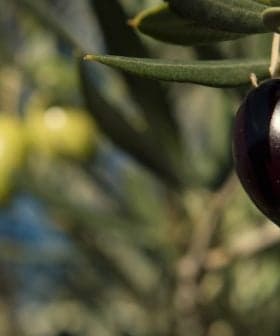Problems, Prospects for Greek Olive Oil
Greek olive oil production is expected to be strong this year, with a surge in exports last year due to high demand and reduced production in Spain. Grigoris Antoniadis of Sevitel is concerned about the lack of regulation in the market, which could lead to health risks, but believes that new tax arrangements may help bring order and increase state revenue.
This should be a good year for Greek olive oil, with 250,000 to 260,000 metric tonnes likely to be produced, according to Grigoris Antoniadis, the president of the Greek Association of Industries and Processors of Olive Oil (Sevitel) and corporate communications director at ELAIS-Unilever Hellas.
Antoniadis told Giorgos Manettas of Imerisia that the 200 percent surge in Greek olive oil exports last year (mainly in bulk) resulted from the combination of Greece’s very good harvest of 300,000 metric tons and Spain’s reduced production. This allowed Greece to make up for part of the production shortfall in the global market. “International olive oil buyers turned primarily to Greece, and secondarily to the rest of the olive oil producing countries in the Mediterranean, such as Tunisia and Turkey,” he said.
The market remains largely unregulated, endangering public health.
Antoniadis added that last year’s increased demand also led to higher producer prices (from €3.50 to €4.00 per kilogram) in Greece. However, with the Spanish crop expected to return to normal this year, “things will return to a balance,” as in previous years, with prices expected between €3 and €3.50.
Antoniadis said he is concerned about how Greek olive oil is distributed. Since 2002, a European Union regulation has required member states to package olive oil in five liter or smaller containers, prohibiting bulk sales both for safety reasons and for the protection of consumers. However, Antoniadis lamented, “thirteen years have passed since then, and nothing has happened. Despite our complaints, the market remains largely unregulated, endangering public health,” as some bulk olive oil in Europe is adulterated with seed oils or colored with unregulated dyes.
As Imerisia reported, Antoniadis suggested there may be an upside to the tax increases proposed for Greek farmers: he believes “the new tax arrangements foreseen for the agricultural world may bring order to the market,” because they “will make it more expensive and difficult to handle the illegal bulk product. Mills and traders will be forced to declare the oil produced and marketed in the tax data, which will reduce the illegal movement. It will be difficult to distribute oil anonymously without documents.”
Antoniadis hopes the result will be a reduction in black market bulk trading, an increase in state revenue, and more bottled and branded Greek olive oil. He argues that “the future of Greek olive oil is in high added value products which will benefit both the producer and the bottler.” He advocates “the promotion of organic olive groves and place names” and increased exports of standardized oils.
He is also optimistic that better regulation of the market could attract more investment from abroad, which has been lacking in Greece in recent years, although Spain and Italy have been investing in new production plants and brand names.
Almost ten years ago, with programs co-financed by the Greek Ministry of Rural Development and the European Union, SEVITEL embarked on a campaign to promote Greek olive oil in more than a dozen different countries. The results were impressive: “in recent years, exports of packaged oil increased by 60 to 70 percent, from 15,000 tons to 25,000 tons a year.”
This helps explain why SEVITEL was judged the top export assistance company at the fourth annual “Greek Exports Awards 2015,” which was organized by the Union of Diplomatic Employees of Economic & Commercial Affairs and Ethos Media S.A. under the auspices of the Hellenic Ministry of Foreign Affairs.
As Imerisia reports, Antoniadis believes “exports are the only way out for Greek olive oil packagers.” In addition to traditional markets in supermarket chains in North America, Australia, and northern Europe, “prospects exist in the Middle East and Latin America, and we place great hope in the markets of China, India, and Russia. The latter are the three major challenges for Greek oil. We are optimistic that we will manage to earn a market share and gain ground there as well, despite fierce competition.”
- Μοναδική διέξοδος για το ελληνικό ελαιόλαδο οι ξένες αγορές (The only way out for Greek olive oil is foreign markets, in Greek)
- Ο ΣΕΒΙΤΕΛ κέρδισε το βραβείο Top Assistance Company (SEVITEL won the award for Top Assistance Company, in Greek)
- Διευθυντής Εταιρικής Επικοινωνίας ΕΛΑΪΣ-Unilever Hellas (Corporate Communications Director at ELAIS-Unilever Hellas, in Greek)









